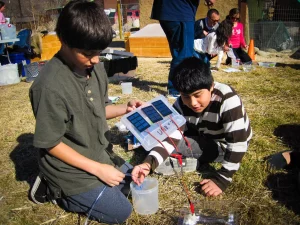
In days of old, a good bit of learning was done by rote memorization.
The lesson is given. Recite and repeat over and over until you’ve got it down.
Rote learning still exists. It gets used in some places and for some topics. A radically different approach is discovery learning. With discovery learning, you work freely on learning tasks with very little guidance. You discover the lesson yourself.
Discovery learning finds its roots in constructivism. It extends from ideas that learners actively seek to make sense of their environments. They learn best by questioning, exploring and actively building knowledge. Good principles for sure. Yet, is discovery learning a successful application of them?
Richard Mayer of the University of California, Santa Barbara, reviewed three bodies of research to find out how well pure discovery learning really works. He published his paper on pure discovery learning in American Psychologist.
In his review, Mayer distinguished between pure discovery learning and guided discovery learning. In the pure form, learners are given tasks and problem to tangle with, but essentially no guidance from their teacher. They might work in groups and discuss with other students. Otherwise, they figure it out on their own.
With the guided version of discovery learning, teachers are much more involved. They might coach the student, give hints and feedback, and perhaps even model solution strategies. Teachers systematically guide students towards the learning objectives.
Mayer compared pure and guided discovery learning for the three tasks. The first had students discover problem-solving rules. The second was about learning the principle of conservation. And the third was about a discovery learning approach for teaching computer programming.
Mayer found that in each of these cases that had been carefully tested, students learned more from guided discovery learning than from pure discovery learning. The main reason for the failure for the pure form of discovery learning is that students tended to miss the relevant information when given the complete freedom to explore. They also developed more misconceptions when learning on their own, at least when learning about how computer programs work.
The researchers from all these studies discovered something important. It’s actually something that adventurers have known through the ages. When you venture into the dark unknown, it’s quite helpful to take a guide.
Image Credit: Black Rock Solar
References
